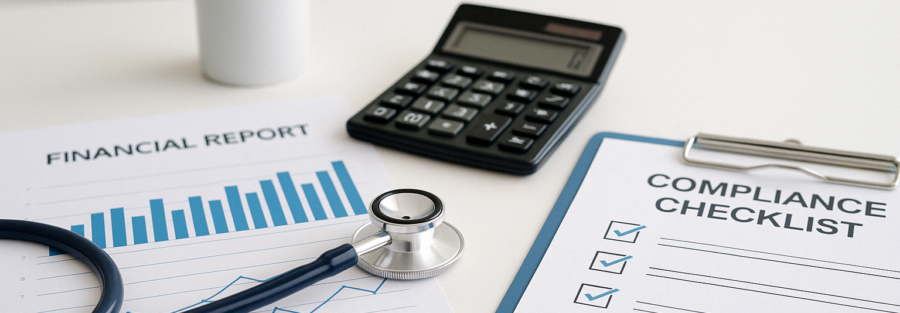As a medical practitioner, if you are running your own medical practice, you will need to have a firm understanding of the compliance and internal control requirements to run your business. Without a doubt – you will need to appoint someone with accounting expertise – either a firm or a full-time employee.
However, as the owner of the medical practice – the proverbial buck ultimately stops with you. In a landscape where regulation and risks abound, you need to understand the financial systems that underpin sustainable healthcare delivery.
This article aims to assist you by painting some broad strokes of the essential financial regulations that apply to South African medical practices, highlighting internal controls that mitigate fraud and financial mismanagement, and outlining the crucial role accountants play in navigating these complexities.
Understanding the Regulatory Landscape
Medical practices in South Africa are subject to multiple layers of financial regulation, starting with the Health Professions Act and the Medical Schemes Act, which govern ethical billing practices and engagements with medical aids. From a financial perspective, several additional acts come into play:
- The Income Tax Act governs the taxation of practice income, including provisional tax, allowable deductions, and reporting obligations.
- The VAT Act requires that practices exceeding the R1 million turnover threshold register for VAT and charge accordingly.
- The Companies Act, for practices that operate as incorporated entities or personal liability companies, introduces requirements related to recordkeeping, annual returns, and solvency.
- The Protection of Personal Information Act (POPIA), while primarily about data privacy, has implications for financial and billing systems that process personal and financial data.
Staying compliant with these regulations ensures that practitioners avoid penalties, maintain professional integrity, and build trust with patients and funders.
Core Areas of Financial Compliance
Financial compliance starts with understanding one’s tax obligations. Whether a medical practice operates as a sole proprietor, partnership, or company, it must:
- Register for provisional tax and submit twice-yearly estimates of income to SARS.
- Register for VAT if income exceeds the required threshold, or voluntarily register if near the limit and seek to claim input VAT.
- Pay PAYE, UIF, and SDL if employing administrative or clinical staff.
- Maintain accurate records—including invoices, receipts, payroll documentation, and patient billing—for a minimum of five years, in accordance with SARS requirements.
In addition to this, it is important to submit accurate medical aid claims. This involves ensuring that codes and tariffs submitted match treatment records. Incorrect or duplicate billing can result in claw backs or sanctions from the HPCSA.
Building Robust Internal Controls
Internal controls are systems and processes that safeguard assets, ensure accurate financial reporting, and promote regulatory compliance. In medical practice, the following areas are especially prone to error or misuse:
1. Billing and Collections
The following are some recommendations with regard to billing, collections and supplier invoice processing:
- Implement clear segregation of duties: separate staff should be responsible for invoicing, collecting payments, processing supplier payments, and bank reconciliations. However, particularly for smaller practices, this might not be realistic. Should there be a certain level of non-segregation, a compensating control would be management oversight / review of underlying records.
- Reconcile patient accounts regularly, especially where there are co-payments or shortfalls from medical aids.
- Use billing software with audit trails that track changes and user activity.
2. Procurement and Inventory
- Medical supplies and consumables should be ordered through an approved procurement process, with proper authorisation levels.
- Stock control systems must monitor usage and flag discrepancies.
3. Payroll Controls
- All salary amounts, changes, bonuses, and reimbursements must be approved and documented.
- It is important to use a reputable payroll system to ensure that statutory deductions are calculated correctly.
4. Data Protection
- Limit access to financial and patient systems to authorised staff only.
- Ensure all digital records are backed up and protected by strong cybersecurity protocols.
These controls reduce the risk of financial loss, fraud, and regulatory breaches—and contribute to operational efficiency.
Common Pitfalls in Practice Finances
The following are common pitfalls:
- Mixing personal and business finances, making it difficult to track expenses and opening the practice up to tax non-compliance.
- Insufficient oversight over the accounting and other records.
- Neglecting to update accounting records timeously, leading to missed filing deadlines or inaccurate tax returns.
- Using non-compliant software for patient records or accounting, especially when dealing with confidential or regulated data.
The Role of Accountants and Tax Practitioners
Every medical practice should have a trusted accountant and tax practitioner. A good accountant helps practitioners:
- Structure their practice appropriately (e.g., sole prop vs personal liability company)
- Manage tax planning compliance
- Implement financial controls and budgeting systems
- Interpret financial data for decision-making
- Maintain accurate financial data for internal and external reporting
Having an accountant who understands the healthcare sector can significantly reduce risk and add long-term value to the practice.
Conclusion
Medical professionals must maintain sound financial systems for their practice’s health and resilience. Compliance is not a once-off task—it’s an ongoing commitment to ethical practice, sustainability, and peace of mind.





